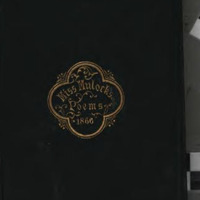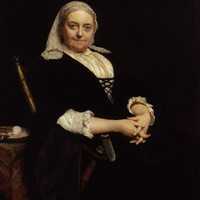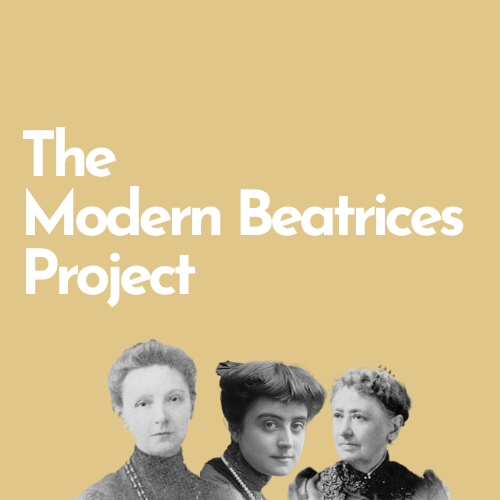Person
Craik, Dinah (1826-1887)
- Title
- Dinah Craik
- Full Name
- Craik, Dinah (1826-1887)
- Pseudonym
- Dinah Maria Mulock
- Miss Mulock
- Mrs. Craik
- Lifespan
- 20 April 1826 – 12 October 1887
- Country of origin
- England, United Kingdom
- Language
- English
- Short biography
-
MULOCK, DINAH MARIA, afterwards Mrs. Craik (1826–1887), authoress, daughter of Thomas Mulock and his wife Dinah, was born on 20 April 1826 at Stoke-upon-Trent, Staffordshire, where her father was then minister of a small congregation.
Her childhood and early youth were much affected by his unsettled fortunes; but she obtained a good education from various quarters, and, feeling conscious of a vocation for author- ship, came to London about 1846, much at the same time as two friends whose assistance was afterwards of the greatest service to her, Alexander Macmillan and Charles Edward Mudie [q. v.] Introduced by Miss Camilla Toulmin to the acquaintance of Westland Marston [q. v.], she rapidly made friends in London, and found great encouragement for the stories for the young to which she at first confined herself, of which 'Cola Monti' (1849) was the best known. In the same year she produced her first three-volume novel, 'The Ogilvies,' which obtained a great success. It was followed in 1850 by 'Olive,' perhaps the most imaginative of her fictions. 'The Head of the Family' (1851) and 'Agatha's Husband' (1853), in which the authoress used with great effect her recollections of East Dorset, were perhaps better constructed and more effective as novels, but had hardly the same charm. The delightful fairy story 'Alice Learmont' was published in 1852, and numerous short stories contributed to periodicals, some displaying great imaginative power, were published in 1853 under the title of 'Avillion and other Tales.' A similar collection, of inferior merit, appeared in 1857 under the title of 'Nothing New.' Thoroughly established in public favour as a successful authoress, Miss Mulock took a cottage at Wildwood, North End, Hampstead, and became the ornament of a very extensive social circle. Her personal attractions were at this period of her life considerable, and her simple cordiality, staunch friendliness, and thorough goodness of heart perfected the fascination. In 1857 appeared the work by which she will be principally remembered, 'John Halifax, Gentleman,' a very noble presentation of the highest ideal of English middle-class life, which after nearly forty years still stands boldly out from the works of the female writers of the period, George Eliot's excepted. In writing 'John Halifax,' however, Miss Mulock had practically delivered her message, and her next important work, 'A Life for a Life' (1859), though a very good novel more highly remunerated, and perhaps at the time more widely read, than 'John Halifax' was far from possessing the latter's enduring charm. 'Mistress and Maid' (1863), which originally appeared in 'Good Words,' was inferior in every respect; and, though the lapse was partly retrieved in ' Christian's Mistake' (1865), her subsequent novels were of no great account.
The genuine passion which had upborne her early works of fiction had not unnaturally faded out of middle life, and had as naturally been replaced by an excess of the didactic element. This the authoress seemed to feel herself, for several of her later publications were undisguisedly didactic essays, of which 'A Woman's Thoughts about Women' and 'Sermons out of Church' obtained most notice. In her later period, however, she returned to the fanciful tale which had so frequently employed her youth, and achieved a great success with 'The Little Lame Prince' (1874), a charming story for the young. She had published poems in 1852, and in 1881 brought her pieces together under the title of 'Poems of Thirty Years, New and Old.' They are a woman's poems, tender, domestic, and sometimes enthusiastic, always genuine song, and the product of real feeling; some such as 'Philip my King,' verses addressed to her godson, Philip Bourke Marston [q. v.], and 'Douglas, Douglas, tender and true'—achieved a wide popularity.
In 1864 Miss Mulock married George Lillie-Craik, esq., a partner in the house of Macmillan & Co., and soon afterwards took up her residence at Shortlands, near Bromley, where she continued until her death. She had become very intimate with M. Guizot and his family, translated his 'Memoir of Barante' and books by his daughter, Madame De Witt, and in her latter years made tours through Cornwall and the north of Ireland, accounts of which were published, with copious illustrations, in 1884 and 1887 respectively. She died suddenly on 12 Oct. 1887 from failure of the heart's action. She had no children. Her memory, both as a woman and as an authoress, will long be preserved by the virtues of which her writings were the expression. She was not a genius, and she does not express the ideals and aspirations of women of exceptional genius: but the tender and philanthropic, and at the same time energetic and practical womanhood of ordinary life has never had a more sufficient representative.
[Miss Frances Martin in the Athenæum, 22 Oct. 1887; Wolley's Think on these Things, a sermon; Men of the Time; Miles's Poets and Poetry of the Century, vol. vii.; Griffin's Contemporary Biography in Addit. MS. 2851: personal knowledge.] - Garnett, Richard (1894). "Mulock, Dinah Maria". In Lee, Sidney (ed.). Dictionary of National Biography. Vol. 39. London: Smith, Elder & Co.
- Selected List of Publications
- "Dante's Meeting with Casello in Purgatory". (From "Il Purgatorio"—Canto II.) January 1848, in The New Monthly Belle Assemblée Vol. 28, pp. 25–26
-
 "Dante's Meeting with Casello in Purgatory". (From "Il Purgatorio"—Canto II.)
"Dante's Meeting with Casello in Purgatory". (From "Il Purgatorio"—Canto II.)
-
 Beatrice to Dante (American Edn)
Beatrice to Dante (American Edn)
Linked resources
- Resource class
- Person
Stoke-on-Trent, Inghilterra, Regno Unito
Item: Craik, Dinah (1826-1887)
Londra, Greater London, Inghilterra, Regno Unito
Item: Craik, Dinah (1826-1887)
- Media
-
 Craik
Craik
Part of Craik, Dinah (1826-1887)
Annotations
There are no annotations for this resource.
Position: 31 (158 views)

